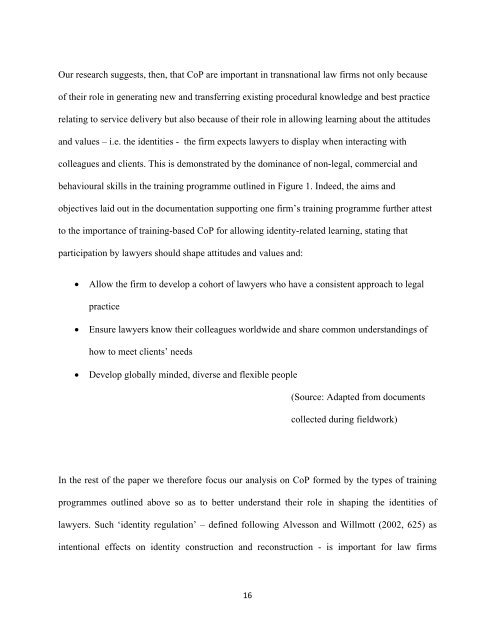Learning to be a lawyer in transnational law firms: communities of ...
Learning to be a lawyer in transnational law firms: communities of ...
Learning to be a lawyer in transnational law firms: communities of ...
Create successful ePaper yourself
Turn your PDF publications into a flip-book with our unique Google optimized e-Paper software.
Our research suggests, then, that CoP are important <strong>in</strong> <strong>transnational</strong> <strong>law</strong> <strong>firms</strong> not only <strong>be</strong>cause<br />
<strong>of</strong> their role <strong>in</strong> generat<strong>in</strong>g new and transferr<strong>in</strong>g exist<strong>in</strong>g procedural knowledge and <strong>be</strong>st practice<br />
relat<strong>in</strong>g <strong>to</strong> service delivery but also <strong>be</strong>cause <strong>of</strong> their role <strong>in</strong> allow<strong>in</strong>g learn<strong>in</strong>g about the attitudes<br />
and values – i.e. the identities - the firm expects <strong><strong>law</strong>yer</strong>s <strong>to</strong> display when <strong>in</strong>teract<strong>in</strong>g with<br />
colleagues and clients. This is demonstrated by the dom<strong>in</strong>ance <strong>of</strong> non-legal, commercial and<br />
<strong>be</strong>havioural skills <strong>in</strong> the tra<strong>in</strong><strong>in</strong>g programme outl<strong>in</strong>ed <strong>in</strong> Figure 1. Indeed, the aims and<br />
objectives laid out <strong>in</strong> the documentation support<strong>in</strong>g one firm’s tra<strong>in</strong><strong>in</strong>g programme further attest<br />
<strong>to</strong> the importance <strong>of</strong> tra<strong>in</strong><strong>in</strong>g-based CoP for allow<strong>in</strong>g identity-related learn<strong>in</strong>g, stat<strong>in</strong>g that<br />
participation by <strong><strong>law</strong>yer</strong>s should shape attitudes and values and:<br />
• Allow the firm <strong>to</strong> develop a cohort <strong>of</strong> <strong><strong>law</strong>yer</strong>s who have a consistent approach <strong>to</strong> legal<br />
practice<br />
• Ensure <strong><strong>law</strong>yer</strong>s know their colleagues worldwide and share common understand<strong>in</strong>gs <strong>of</strong><br />
how <strong>to</strong> meet clients’ needs<br />
• Develop globally m<strong>in</strong>ded, diverse and flexible people<br />
(Source: Adapted from documents<br />
collected dur<strong>in</strong>g fieldwork)<br />
In the rest <strong>of</strong> the paper we therefore focus our analysis on CoP formed by the types <strong>of</strong> tra<strong>in</strong><strong>in</strong>g<br />
programmes outl<strong>in</strong>ed above so as <strong>to</strong> <strong>be</strong>tter understand their role <strong>in</strong> shap<strong>in</strong>g the identities <strong>of</strong><br />
<strong><strong>law</strong>yer</strong>s. Such ‘identity regulation’ – def<strong>in</strong>ed follow<strong>in</strong>g Alvesson and Willmott (2002, 625) as<br />
<strong>in</strong>tentional effects on identity construction and reconstruction - is important for <strong>law</strong> <strong>firms</strong><br />
16
















